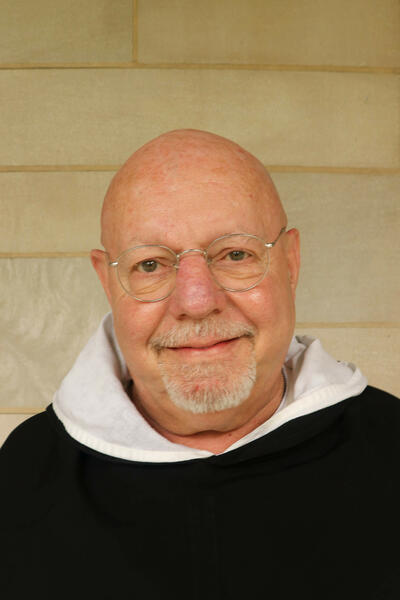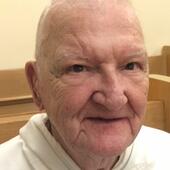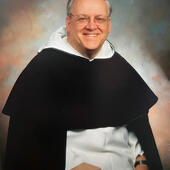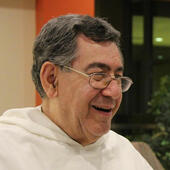Fr. Stanley Anthony Drongowski, OP
Stanley Anthony Drongowski, OP, 71, died unexpectedly on July 9, 2023. He was born to Stanley and Grace (née Kline) Drongowski on September 25, 1951, in Cleveland, Ohio. He attended grammar school at St. Mary School in Oak Ridge, Tennessee, and St. Patrick School in Kent, Ohio. He received his diploma from Roosevelt High School in Kent, and his BA in English from Kent State University in 1974. On October 2, 1974, Stanley entered the Dominican Order and professed first vows on October 4, 1975. He began studies for the priesthood at Aquinas Institute of theology in Dubuque, Iowa where he was ordained at St. Rose Priory on October 6, 1979.
Fr. Stan began his priestly ministry at Blessed Sacrament Parish in Madison, Wisconsin, from 1980 to 1983 where he returned as Pastor in 1996. In between, he served as Novice Master, guiding new Dominicans in their first year as friars, and completed a D.Min. in Preaching from Aquinas Institute. From 2005 until his death, he ministered to college students – first at Indiana University in Bloomington, and then at Aquinas College in Grand Rapids, Michigan. Fr. Stan is remembered for his joyful exuberance and generosity. His ability to encourage others made him a trusted friend and advisor to many, both young and old.
In Addition to his Dominican Community, Fr. Stan is survived by his brother, Steve Drongowski, and sisters Mary Dworakowski, Susan Barry, Laure Beal, Amy Reilly, and Shari Chandra, as well as numerous nieces and nephews. He was preceded in death by his sister Ann Dodds.
Here is his funeral homily given by Fr. Donald Goergen, OP at St. Vincent Ferrer Parish, River Forest, on July 18, 2023:
Bishop Walkowiak, Stan’s family, his brother Steve, his sisters, Mary, Susan, Laure, Amy, Shari, and his Dominican family, and Stan’s friends, thank you all for coming.
It is interesting to me that in our second reading, which Stan chose for his funeral (2 Cor 12:7-10), it speaks of weakness. When I am weak, then I am strong, God’s power is at its best in weakness. According to St. Paul, then, a weakness is not a weakness. Yet this was on Stan’s mind. Was he conscious of his own limitations, of his own weaknesses, of his trust that whatever good he did, it was God working through him? A sadness of mine is that I have often thought that Stan was never fully aware of how much he was loved, respected, gifted, talented. His was a quiet, on the sidelines, unvarnished holiness.
A holiness, however, for which family, friends, and faith were the foundation. How he loved his family, often spoke about them. Friendship was important for him. And he was grounded in his faith. He loved those he served, whether parishioners in Denver or Madison, or students in Bloomington or Grand Rapids, he was attentive to them. He was always ready to respond to a call for help.
He also loved art, music, poetry, literature, language, the use of words, about which he could even be pedantic. I often hesitated to give him something I had written to edit for fear it would come back and take more time to re-work than I had put into it in the beginning. Grammar was important. There were simply some things up with which he would not put.
In our Gospel text from John (12: 23-26), it speaks about a grain of wheat, unless it falls and dies, it will not bear fruit. In its own way a consoling image for death and resurrection. The caterpillar becomes the butterfly. Is it consoling? Well, yes, but no, and yet in the end yes. Yes, it does teach us something about death, how death is necessary for us to bear fruit. It tells us that there is more to life than death, that death is not the bottom line, or as St. Paul puts it in another of his letters, “Eye has not seen, nor ear heard, nor could we possibly imagine what God has in store for those who love him" (1 Cor 2:9). But is it really consoling? Of course, we know that life is not ended, that bliss awaits us, that Stan already enjoys it. At the same time, we are here, and I don’t know what Stan is thinking, what he is doing, how to communicate with him. So all to the good, except it is not necessarily consoling for us. We know that Stan is better off, but there’s a lot we want to know that we don’t know.
In the end, however, it is only with death that we know who someone is, the meaning of a person’s life. It is only when we see the life as a whole, not just a part of it, experience the loss, that we know who someone is. Ecclesiastes tells us that there is a time to be born, and a time to die, a time to laugh and a time to weep. Stan loved to laugh. He had a unique sense of humor, a little odd, at times even embarrassing. I learned just to call it Polish. But his life was also not easy. There was much sadness. His mother died when he was very young, and he learned to love Dorothy who really became his mother. But I also think of May 4, 1970, as he was walking across the campus of Kent State University when the Kent State killings took place. They left a wound. He was never able to watch with me Ken Burns’ series on Vietnam. It brought back too many memories. Some wounds are not healed.
In our first reading from the prophet Isaiah (Is 25:6-9), he speaks about a time when all tears will be wiped away. But for us, here, however, there is the wound. It is best put by Dietrich Bonhoeffer in a letter he wrote from prison during the time of Nazi Germany:
I wish I could say something to help you in the time of separation which lies immediately ahead. There is no need to speak about its difficulties, but as I have learnt something about it myself during the last nine months, having been separated during that time from all those I love, I should like to pass it on to you.In the first place nothing can fill the gap when we are away from those we love, and it would be wrong to try and find anything. We must simply hold out and win through. That sounds very hard at first, but at the same time it is a great consolation, since leaving the gap unfilled preserves the bonds between us. It is nonsense to say that God fills the gap: he does not fill it, but keeps it empty so that our communion with another may be kept alive, even at the cost of pain.
from Dietrich Bonhoeffer, “Letters and Papers from Prison”
There is a hole in our hearts that remains. But as we look back at Stan’s life, what does he want to say to us today? I think what he wants to say, what his life was about, is: Love one another. Please love one another, as I have loved you, even though love never comes pain free.
I would like to conclude with a paraphrase of a contemporary poem.
With tears in my eyes and a heavy heart,
I stand on the shore watching a far away ship
as it slowly disappears over the horizon.
“There he goes. There he goes.”
There go my love and my memories.
I watch the ship disappear completely from my view.
But what I cannot see are those on the other shore.
Those who are also watching the same ship as it now comes into view.
Those who, as I wipe my tears, are saying,
“Here he comes. Here he comes.”
And that, my friends, is what dying is.





